Berichte zu aktuellen Forschungen

Berichte zu aktuellen Forschungen
Mitarbeiter*innen berichten über ihre aktuellen Forschungen bzw. Forschungsaufenthalte
Conference Brief: The Global South and the new Worl Order
Conference Brief
The Global South and the new Worl Order
Vienna June 9 to 13, 2025
The Global South and World Order (GSWO) conference, held in Vienna from June 9 to 13, 2025, brought together scholars from diverse disciplines to engage with the shifting dynamics of global power, with particular emphasis on the Middle East and North Africa (MENA) region. Hosted by the University of Vienna, Department of Development Studies in cooperation with Security in Context (SiC), the University of Oklahoma, and the Syrian Center for Policy Research (SCPR), the conference formed part of an ongoing effort to rethink how global hierarchies are conceptualized and studied. Over several days of dialogue, participants examined both theoretical frameworks in the global political economy and specific regional developments.
The first two days focused primarily on Syria, addressing the protracted conflict and the implications for knowledge production in settings marked by insecurity. Discussions emphasized the long-term political, economic, and social consequences of war, including the securitization of the political sphere and the nature of post-conflict governance. Scholars analyzed the systematic de-development of Syria’s institutions and infrastructure, exploring how these dynamics have eroded civic spaces and hindered meaningful, transformative strategies.
On the first day, research presented through collaboration between SiC, the University of Oklahoma, and SCPR underscored the importance of grounded, empirical analysis for understanding Syria’s fragmented political and institutional landscape. These sessions examined the role of international and regional actors in shaping the political economy of post-conflict Syria and introduced the concept of subordination as a lens to analyze the responses and roles of key actors, often aligned with hegemonic global and local powers. The day concluded with a discussion on the importance of cultivating homegrown, independent spaces for critical and transformative knowledge production in Syria and the wider region.
The second day focused on joint research projects between the University of Vienna and SCPR, including “Participatory Research in MENA Contexts” and “Know War II”. Presenters emphasized the value of developing context-relevant participatory methodologies to enhance political engagement and promote inclusive development. The sessions also highlighted the role of alternative solidarity economies as a means of countering conflict-driven and extractive economic models. The final session addressed the challenges of reconstruction in the MENA region, warning of the risks posed by authoritarianism, occupation, militarism, dependency, and neoliberal approaches.
Following the Syria-focused sessions, the agenda expanded to broader regional themes, particularly the role of small states in an evolving global order. Presentations explored patterns of South-South cooperation—including arms trade, economic partnerships, and shifting alliances—offering comparative insights into how smaller states navigate global power asymmetries.
The final segment of the conference, held on June 12 and 13, returned to the core theme of the Global South and World Order. These sessions critically examined the MENA region’s role in an increasingly multipolar world. Discussions addressed the influence of traditional great powers such as the United States and Europe, alongside the growing prominence of Russia, China, Türkiye, and the Gulf states. Special attention was given to the ongoing violence in Gaza and Sudan, explored through frameworks of land dispossession, ethnic cleansing, and genocide, as well as broader geopolitical shifts.
A central debate focused on the concept of “sub-imperialism” and its relevance for explaining the behaviors of emerging regional powers—particularly the Gulf states—whose actions increasingly blur the line between imperial subjects and agents. The intersections of economic extraction, military influence, and political alliances were key themes in these discussions.
Two public events complemented the academic sessions. The first, held on June 10 and titled “Economy, Identity and Institutions: The Struggle for a New Syria” the challenges of reconstruction amid fragmented authority and a shifting post-Assad political landscape were critically analyses and discussed.
The second, held on June 12 and titled "The Middle East in a Changing Regional and Global Order: Perspectives on Militarism, Security and Political Economy”, engaged with evolving security dynamics in the region. Drawing on Critical Security Studies, the event critiqued traditional state-centric models, offering insights relevant both regionally and globally, and proposed alternative frameworks rooted in socio-economic analysis and political agency.”, engaged with evolving security dynamics in the region. Drawing on Critical Security Studies, the event critiqued traditional state-centric paradigms and proposed alternative frameworks rooted in socio-economic analysis and political agency.
The conference concluded with a collective recognition of the need for more nuanced conceptual tools to analyze global political structures—tools that move beyond outdated binaries such as North/South or imperial/anti-imperial. The output of the conference will include a written report organized thematically around key sessions, as well as short contributions from participants, to be published by Security in Context.
Research Stay in Zimbabwe, March-August 2024
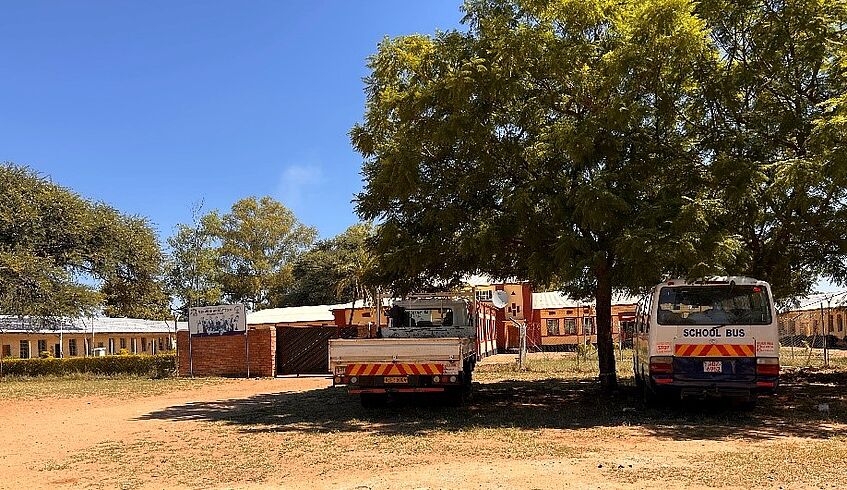
Research Stay in Zimbabwe, March-August 2024
By Nyamadzawo Sibanda
My PhD research focuses on return migration and post-return embeddedness in Zimbabwe. The fieldwork is concentrated on the southwestern end of the country, a region known as Matabeleland, due to its long history of emigration. Before the current main fieldwork, I conducted some preliminary engagements with organisational and individual experts in the area of migration in Zimbabwe and the Southern African region in the summer of 2023. These included the Migrant Resource Centre (left) (jointly funded by IOM and Ministry of Public Service, Labour and Social Welfare) and the Catholic Commission for Justice and Peace (CCJP). While, my research focuses on the experiences of migrants, consulting experts and organisations gave me an appreciation of the return context, which was invaluable in my following fieldwork.
The current fieldwork was schedule from March to July 2024, with the intention of conducting individual interviews with returnees in three sites, Tsholotsho, Plumtree (border town with Botswana), and Lupane. However, with the aid of my host university, Lupane State University (LSU), which is located in Matabeleland North Province, between Bulawayo and Victoria Falls (border town with Zambia, Namibia & Botswana), I managed to conduct interviews in four sites, including Esigodini, which is a peri-urban area between Bulawayo and Beitbridge border post (towards South Africa). All interviews were conducted either in participant’s homestead or places of business, for those who had shops.
I also had conversations individuals in local schools, NGOs and businesses, most of which was insightful on how return migration and its impact is perceived by local communities, and experienced by local institutions. Through these discussions, there was an indication that emigration and consequent return has engendered some sociocultural transformation in the region, witnessed in the education system and local businesses. While most returnees invest in domestic (building houses, purchasing cattle) consumptions activities, and make no overt political shifts, it was clear from various stakeholders how processes of emigration and return influence socioeconomic imagination of the region, in what was described by the local Roman Catholic priest, Fr Lupahla, as a “double-edged” sword. Of the 35 interviews I conducted, 27 are returnees from South Africa!
I appreciate all the support from the department, including from Professor Petra Dannecker, in the negotiations for hosting arrangements at Lupane State University, with the LSU Dean of Humanities, Dr Nozizwe Dhlamini. I also got exceptional support from management at LSU and the department of Development studies, in the persons of Dr Nozizwe Dhlamini, Miss Precious Ngwenya (chairperson), and the lecturing stuff in department (most of whom invited me as a guest lecturer in their classes).
Report on the Kickoff event of the Project Youth engagement of Fridays for Future
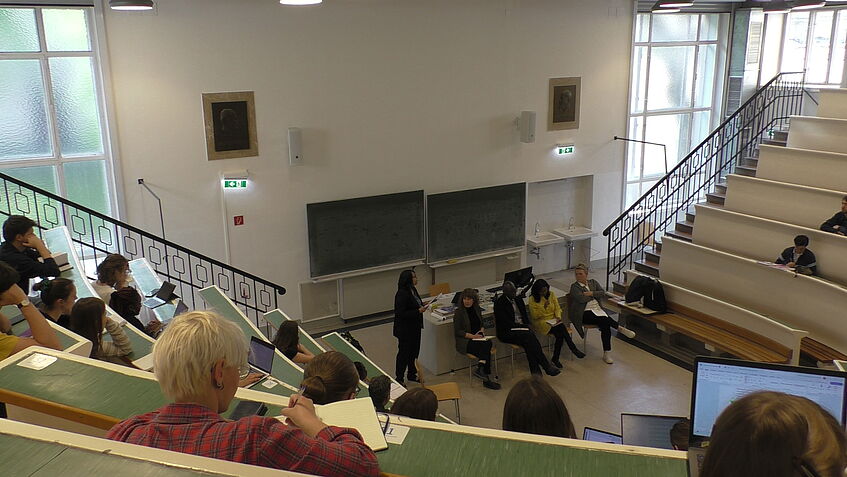
© Michaela Hochmuth
Report on the Kickoff event of the Project Youth engagement of Fridays for Future
Youth engagement of Fridays for Future. An intersectional and global perspective of Fridays for Future
Kick-off workshop 11th to 12th of April 2024
In order to launch the project "Youth Activism and Fridays For Future. An intersectional and global perspective" (funded by the Austrian Science Fund), a kick-off workshop was organised on 11-12 April 2024. Against the backdrop of the 2019 wave of environmental youth movements inspired by Greta Thunberg (Fridays For Future movement), it is evident that youth engagement has not received in-depth academic attention, neither in the field of youth studies nor in social movement studies, and especially not with regard to youth engagement in the Global South. This project aims to fill this knowledge gap by conducting a comparative study of environmental youth activism in Austria, Uganda and Bangladesh, focusing on environmental activists in the Global South. The project will be carried out in partnership between the University of Vienna (Austria), Makerere University (Uganda) and Jahangirnagar University (Bangladesh).
After months of extensive desk research by the project team to gain in-depth knowledge of the contexts, especially the different actors in the different settings, a kick-off workshop was organised to launch the project. The workshop served as a platform to communicate the project's objectives to the general public. To this end, a panel discussion on "Environmental Activism from a Global Perspective" was organised on Thursday 11 April as part of the Department of Development Studies' public lecture series, the ie.talks. Moderated by Fahima Al Farabi, the panelists Prof. Dr. Esuruku from Makerere University (Uganda), Prof. Dr. Naher from Jahangirnagar University (Bangladesh), Dr. Antje Daniel and Prof. Dr. Petra Dannecker (both University of Vienna, Austria) discussed questions of environmental activism from a global perspective. Students, staff and interested members of the public attended the event. The panel discussion and the two-day workshop were a great success, especially the latter, which provided a space and platform for the team and project coordinators to meet, share and plan the next steps together. The project team is currently preparing for their first field trips to Uganda and Bangladesh.
Project leader: Dr. Daniel, Department of Development Studies, University of Vienna
Co-project leader: Prof. Dr. Dannecker, Department of Development Studies, University of Vienna
Cooperation partner: Prof. Dr. Naher, Jahangirnagar University, Dhaka and Prof. Dr. Esuruku, Makarere University
Funded by: Austrian Science Fond (FWF) 2023-2026
Project page: Youth activism and Fridays for Future. An intersectional and global perspective (univie.ac.at)
Research stays in Ethiopia and Kenya – September/October 2022, and February/March 2023
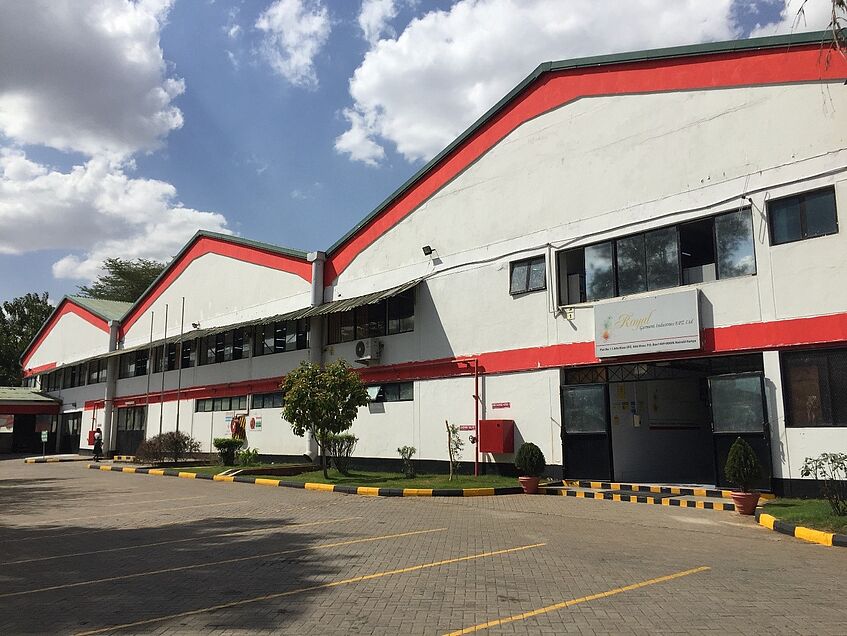
©Felix Maile
Research stays in Ethiopia and Kenya – September/October 2022, and February/March 2023
by Felix Maile, Shika Sethia and Cornelia Staritz
As part of the AfricaApparel project – a partnership that includes the University of Nairobi, Mekelle University, the Copenhagen Business School, the King’s College London and the University of Vienna, we travelled twice to Ethiopia and to Kenya. The Africa Apparel project examines whether and under which conditions Ethiopia’s and Kenya’s integration into the global apparel industry can be sustainable for both supplier firms and workers.
During the first trip in September and October 2022, we wanted to understand what the sourcing patterns of global fashion brands and retailers entail for value capture, working conditions and wages in apparel export factories in Ethiopia and Kenya. Together with our project colleagues, we conducted two different surveys with general managers, human resources managers and production managers of supplier firms based in several industrial parks in Ethiopia (Bole Lemi, Adama and Hawasa) and two locations in Kenya (Machakos/Nairobi area and Mombasa/ Kilifi area). We also conducted semi-structured interviews with government officials from key institutions such as the Ethiopian Investment Commission, the Kenyan Export Processing Zone Authority (EPZA), as well as with representatives from the respective trade unions, fashion brands and retailers, and research institutes.
During a second visit in February and March 2023, we conducted follow-up interviews with several firms and met with our team members for a workshop in Nairobi, where we discussed the results of the surveys and interviews: the COVID-19 pandemic, the civil war in Ethiopia and the related loss of the AGOA duty-free access to the US market, and the recent recession in the EU and the US all appeared to have had a severe impact for both supplier firms and workers in Ethiopia, and to a lesser extent also in Kenya, as some factories closed and workers were laid off. Further, the value that is retained in both countries is limited due to several factors: The end buyers are setting the prices and requirements and thus leave low margins for supplier firms; the AGOA scheme allows for imported inputs so that the activities done in Ethiopia and Kenya are mostly limited to the final assembly of apparel products; and the sector is dominated by foreign-owned firms that have offshore headquarters. In Kenya, the situation is particularly challenging for local firms that face difficulties in accessing finance and receiving direct orders from buyers, and thus often work on a subcontract basis for foreign-owned supplier firms. In Ethiopia, there are almost no locally owned firms that export. Wages in Ethiopia are far lower than in Kenya, and working conditions in the region are problematic – we received anecdotal evidence of union-busting, sexual harassment complaints and unfair dismissals. At the same time, the trade unions are a stable political force in Kenya and unionization is gaining ground in Ethiopia, which has the potential to protect workers’ interests and to improve the overall working conditions in these factories.
Research stay in Peru, February/March 2023
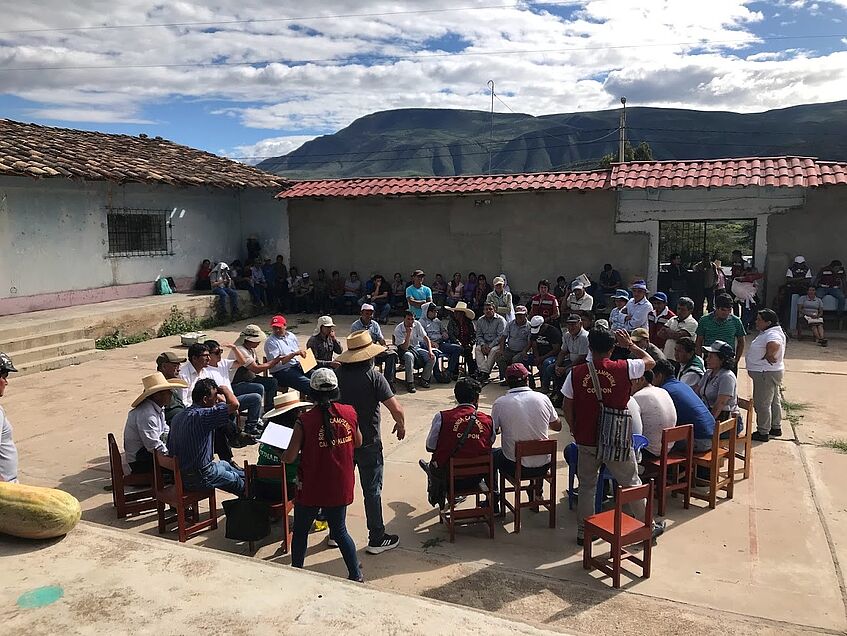
©Alina Heuser
Research stay in Peru, February/March 2023
by Alina Heuser
I recently conducted a seven-week exploratory research stay in the Andean highlands of Peru as well as in Lima, its capital city, in order to connect with fellow researchers, activists, and community members working on or affected by socio-ecological conflicts in the context of mining extractivism. I aimed to learn from their thoughts, experiences, and insights on gender and protest. My research stay took place at the CISEPA social sciences research centre of the Pontificia Universidad Católica, where I previously studied Anthropology and Political Sciences during my Bachelor's degree. During my research stay, I collected empirical data using ethnographic methods, primarily through qualitative interviews, informal conversations, and participant observation. I focused on understanding the impact of mining on gender relations and local protest movements. My fieldwork initially took me to Cajamarca and its surrounding provinces, where I had the opportunity to participate in a gathering of environmental activists and community members in the Valle of Condebamba. There, I met some of the women environmental defenders from the newly formed cooperative, Cooperativa Mujeres Defensoras y Emprendadoras. Additionally, I conducted fieldwork in the southern mining corridor, specifically in the region of Espinar, where the Tintaya-Antapaccay copper mine is located. Throughout my research stay, I received valuable support from CISEPA as well as from members of Red Muqui, Grufides and Derechos Humanos sin Fronteras. I am looking forward to continuing our collaboration in the future. I had the opportunity to share and discuss my research insights during an open lecture held at PUCP on March 20th. The event brought together actors of environmental activism, NGOs, and social science scholars. Additionally, an interview (conducted in Spanish) about my research experience at CISEPA can be found at the website of Centro de Investigaciones Sociológicas, Económicas, Políticas y Antropológicas (CISEPA) of the Pontifícia Universidad Católica del Perú (PUCP).
Research Stays in the DRC, Zambia and Zimbabwe 2022/2023
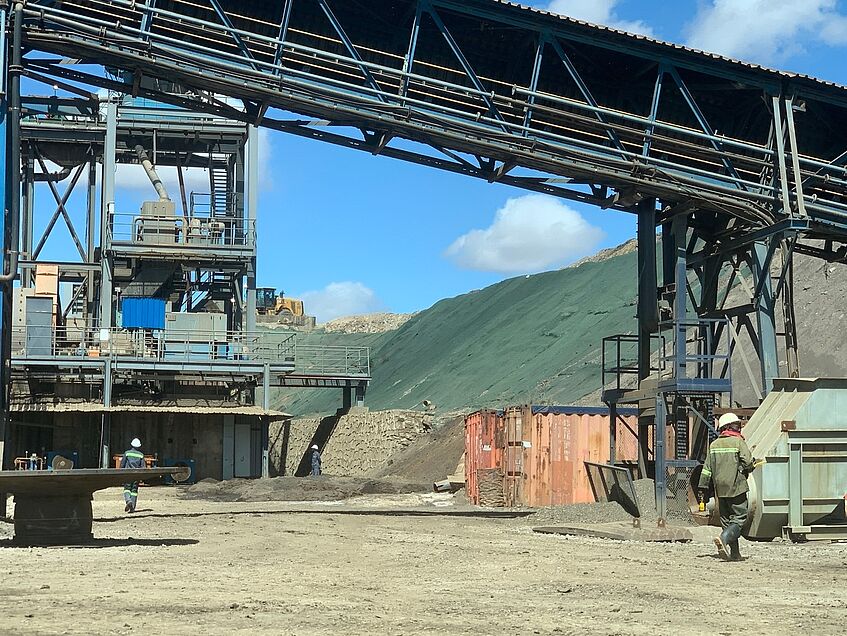
©Aleksandra Wojewska
Research Stays in the DRC, Zambia and Zimbabwe 2022/2023
by Aleksandrea Wojewska
In my thesis, I explore how the prices of cobalt and lithium are determined. First, I analyse the financial trading processes at metal derivative markets through which world prices of cobalt and lithium are set. I then trace across scales – from derivative markets to mining sites – how the resulting world prices are taken up by actors engaged in the extraction, processing and trade of these metals. I specifically focus on the distributive outcomes of these processes in three producer countries – DRC and Zambia for cobalt as well as Zimbabwe for lithium.
The empirical data collection for my thesis has been ongoing since autumn 2021. In November 2021, I conducted semi-structured interviews in London with representatives of the key global derivative market for metals - the London Metal Exchange - as well as with Price Reporting Agencies, commercial metal traders and financial investors. Throughout December 2021, I conducted online interviews with financial investors, commercial traders and trading associations based in Switzerland. These two rounds of interviews had the common objective of characterising mechanisms and practices related to determination world prices.
In 2022, I travelled to DRC (20.05-11.06) and Zambia (12.06 -1.07), where I conducted interviews with policy actors, mining and processing companies, international and national traders, artisanal miners and civil society organisations. In 2023 I conducted a fieldwork in Zimbabwe (09.01-04.02) funded by Kurzfristige wissenschaftliche Auslandsstipendien (KWA) grant at the University of Vienna, where I conducted interviews with civil society and sector experts who work or are active in the field of lithium mining and minerals. During my fieldworks I developed close links with The University of Lubumbashi in DRC, the Southern African Institute for Policy and Research (SAIPAR) in Zambia and the Zimbabwe Environmental Lawyers Association (ZELA) in Zimbabwe. The objective of fieldworks in these three countries was to characterise the price transmission mechanisms, explore how the prices established at derivative markets are taken up in physical trade as well as to investigate the distribution of the value from extraction, processing, and trade of lithium and cobalt across actors and locations.
I am planning two further research stays as a part of my thesis, funded by the OeAD Marietta Blau-Grant. In autumn 2023 I will conduct research in South Africa, Zimbabwe and Zambia over the course of 12 weeks and in spring 2024 I will travel to London for three months to conduct follow-up interviews and archival research on commodity derivative trading.
